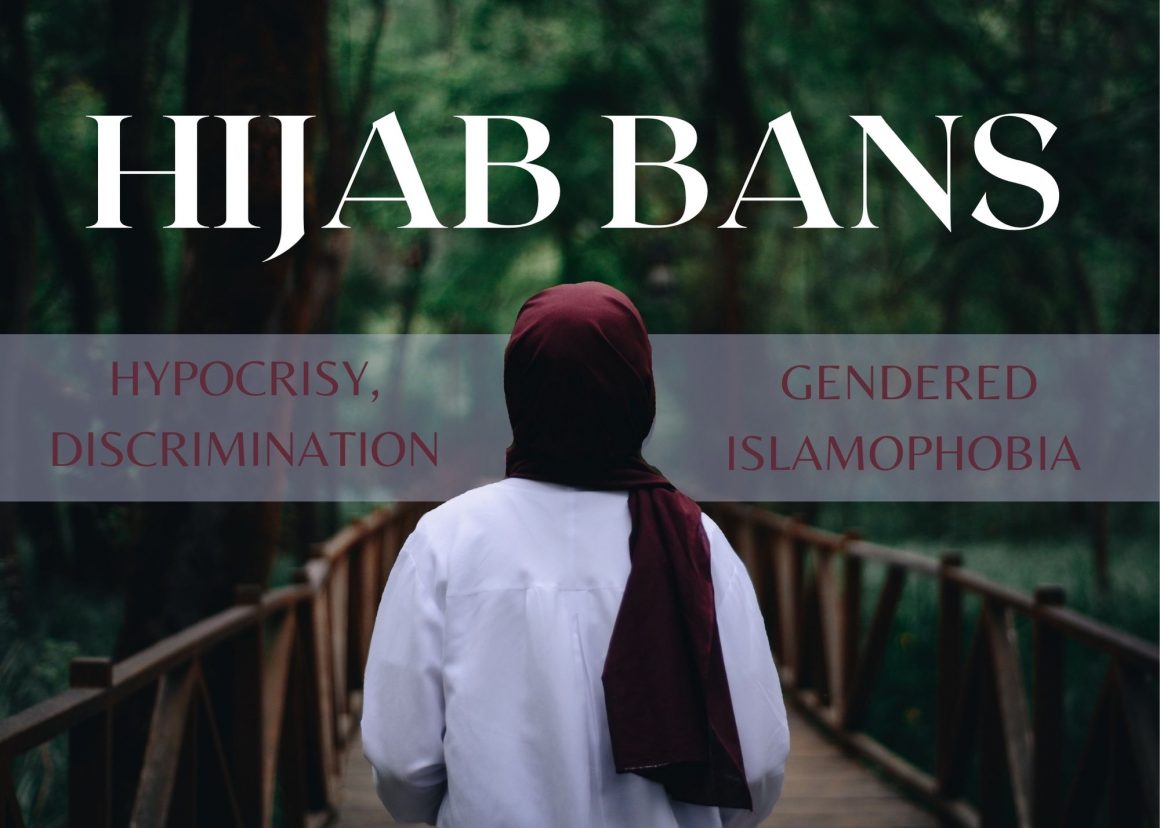
Hijab bans: Orientalism and hypocrisy
By Lamara Jaber, March 14 2022—
Two hundred million Muslims in India have become an example of failed democracy that insists on ethnic minority protections regardless of “majoritarian” rule. Through the hijab ban in educational institutions of Karnataka and a possible nationwide ban, narratives concerning hijab discrimination and gendered Islamophobia fall short of constitutional safeguards.
This legislative discrimination against Muslim women enables an arena of hypocrisy and contested double standards. From Hijabs to balaclavas, religious and “fashionable” notions should garner the same level of legitimacy and welcome.
Social media attention and praise toward Julia Fox wearing a headscarf, as reinforced by Vogue France’s Instagram post, exposes distinct reactions when Muslim women find themselves as targets for misleading narratives concerning “freedom” or “women’s rights.” As Muslim women perceive hijabs and face coverings as protection from predatory eyes and sexualization, Westernized ideals of freedom become the center of concern.
In every societal institution, Hijabi women become opportunities and manifestations for curious questions, while individuals overlook their simple choice of practicing their religion. As Quebec and France insist hijab and religious attire bans promote secular tradition or “equality” for women, the counterproductivity of these laws radiate as numerous rights of Muslim women are discounted as indifferent in laws and policies.
In a direct attempt to assimilate certain religions, this produces social characterizations and notions of “belonging.” To illustrate, when Kim Kardashian wore a full-body garment — similar to a Burqa — to the Met Gala, she was praised for being a fashion icon. Yet when millions of Muslim women do this, they are immediately branded as “excessive” or “oppressed.” As individual freedoms are celebrated by many, the hypocrisy and failures committed in such legalities, reflect just how multicultural and inclusive progressive countries can be.
When applying an intersectional lens to see why and how certain laws become geared to differentiate individuals and collectives, head coverings are not limited to Islam or even religious motivations Whether referencing Christianity or Judaism, discrimination should not be on religious grounds. Members of the Black community have become racially profiled due to “their appearance” of so-called gangs — such nonsensical domains and practices fail to bring effective change.
Whether citing France, Quebec or India as examples of hijab bans, such laws represent an attempt to govern and constrain feminine bodies. As Muslim women become legally challenged in practicing their inherent rights of religious expression and choice, the public sphere engulfs static feminine beliefs and paternalistic mentalities.
In contrast, the private lives of Muslim women enables individual and collective freedoms to the feminine domains of Islam. Moreover, purposeful narratives that such rules aim to enhance one’s “safety” in a public sphere enforce problematic portrayals where women are expected to assume full responsibility. That is, if they endure any harm based solely on their physical appearance while predators are absolved from any guilt. Constantly describing Muslim women as helpless and oppressed, victimizes them and denies their agency while reproducing ‘moral’ grounds for many colonial thinkers and institutions.
Governments that justify hijab bans are also especially controversial when considering a country’s explicit colonial history. Vital to colonial justifications and nature is the conviction of implementing “superior” cultural norms and values to “inferior” populations that require so-called advancement and help.
In practice, discriminatory hijab bans implement fixed definitions and images of citizenship and belonging while deliberately omitting Muslim women in the head, face and body coverings. About Palestinian scholar Edward Said and his theory of Orientalism which theorizes upon the colonizer and the colonized, the “other” becomes represented as “inferior, underdeveloped and opposite” in the eyes of the West. One notable example of this is apparent in media portrayals of Islam. In cherry-picking superficial facts about the religion, powerful and harmful narratives and stereotypes become planted.
In one passage of the Quran, the direction is given to both men and women to observe and enact modesty. Yet powerful media outlets and authoritative figures falsely contend that Muslim women are the only ones “forced” to be modest and must be “liberated” from such discourses.
This exposes gendered Islamophobia where Muslim women and their choice of veiling becomes an arena of contested debate and legitimacy even though Muslim men are also called upon to follow dress codes. By focusing on this, colonial states and governments legitimize their negative connotations of dominance and “progress” concerning the East and its peoples.
This fabricated view of othering was justified and utilized in the West concerning their imperial conquest of North Africa, Asia and the Middle East. As this lens reinforces mainstream discourse, Orientalism persists today as people hold preconceived notions about what it means for one to be a Muslim.
Here, the issue of the veil is either depicted as the “backwardness” of the East or an act of resistance to Western imperialism. When this discourse equates to a woman’s liberation without a veil, arguments for freedom and religious choice become blatant excuses when governments construct their supposed ideal and proper body politic. Thus, these preferential legalities not only define who belongs to a country but enact assumptions that there is an absolute difference between “us” and “them.”
This article is part of our Opinions section and does not necessarily reflect the views of the Gauntlet’s editorial board.
